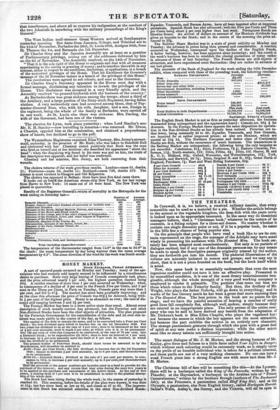THE THEATRES.
In Cornwall, it is, we believe, a received culinary maxim, that every comestible can be used as a material for a pie. Whether the article belongs to the animal or the vegetable kingdom, the deep dish with the paste cover is looked upon as its appropriate tenement. In the same way do theatrical managers believe, that a " Christmas book," whatever be the nature of its contents, is a fitting subject for a three-act drama. No matter whether it contain one single dramatic point or not, if it be a popular book, its name in the bills has a chance of being popular also.
On the principle that people who have read a book like to see its con- tents represented on the stage, the manager of the Adelphi may have acted wisely in presenting his audience with The Haunted Man. The book cer- tainly has been adapted most conscientiously. Not only is no particle of dialogue omitted, but if any one of the dramatis persona can by any means be made to speak the descriptive passages originally uttered by the author, they are forthwith put into his mouth. The pictorial illustrations of the volume are minutely imitated in scenes and groups; and we may say in short, that it is not a piece founded on the book, but the book itself which is acted.
Now, this same book is so essentially undramatic that even the most ingenious modifier could not turn it into an effective play. Presented in its unmodified condition, it is one of the most dreary entertainments ima- ginable, although the whole strength of a very good working company is employed to render it palatable. The portions that come out best are those which relate to the Tetterby family. But then, the drollery of Mr. Wright, who plays the father Tetterby, will go down in everything; and in works of far less literary merit he has been a great deal more amusing than in The Haunted Man. The best points in the book are no points for the stage; and we have the painful sensation of hearing a number of really good lines fall completely flat, although well spoken, simply because they are uttered in an inappropriate place. The only person of the entire com- pany who can be said to have derived any benefit from the adaptation of Mr. Dickens's book is Miss Ellen Chaplin, who plays the vagabond boy: not because the scenes in which the boy appears are the most attractive, but because the part exhibits the actress in an entirely new character. The strange pantomimic gestures through which she goes with a great deal of spirit at any rate make a distinct impression; while the other actors seem like so many talents not sufficiently brought into action.


























 Previous page
Previous page